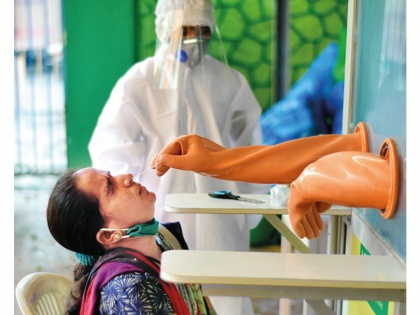57% of Mumbai slum population has developed antibodies, Serological survey study reveals
By Lokmat English Desk | Published: July 29, 2020 01:03 PM2020-07-29T13:03:03+5:302020-07-29T13:04:49+5:30
According to a sero-surveillance study conducted in Mumbai, it has revealed that 57% of the population of slum areas ...

57% of Mumbai slum population has developed antibodies, Serological survey study reveals
According to a sero-surveillance study conducted in Mumbai, it has revealed that 57% of the population of slum areas and 16% of non-slum residents in three civic wards had developed antibodies. The results indicate that many people would already be affected by COVID-19 than the official tally suggests.
The survey was conducted on June 3 and 6,936 samples out of an estimated 8,870 were collected from slum and non-slum areas of three civic wards - R-North, M-West and F-North - in the first half of July.
"These results will be valuable to learn more about herd immunity," stated a Brihanmumbai Municipal Corporation (BMC) release.
What exactly is a serological survey ?
A serological survey involves testing of blood serum of individuals to check for the prevalence of antibodies against an infection.
The sero-surveillance study found high proportion of asymptomatic COVID-19 infection in the city.
The BMC claimed that higher prevalence in slums could possibly be due to the population density and shared common facilities like toilets and water points, the release said.
BMC claimed that although it is not yet unclear what level of prevalence leads to herd immunity, as per the results it indicates that in the slum areas it could be achieved sooner than later, if the immunity exists and persists in a significant proportion of the population.
The civic body said the sero-surveillance survey also indicates that the infection fatality rate (IFR) is likely to be very low, in the range of 0.05-0.10 per cent.
"Lower prevalence in non-slums could be due to better social distancing and access to better hygiene in addition to interventions by MCGM (BMC) to stem the spread of infection," the BMC stated.
Mumbai has recorded 1,10,846 COVID-19 cases and 6,184 deaths till July 28.
Open in app